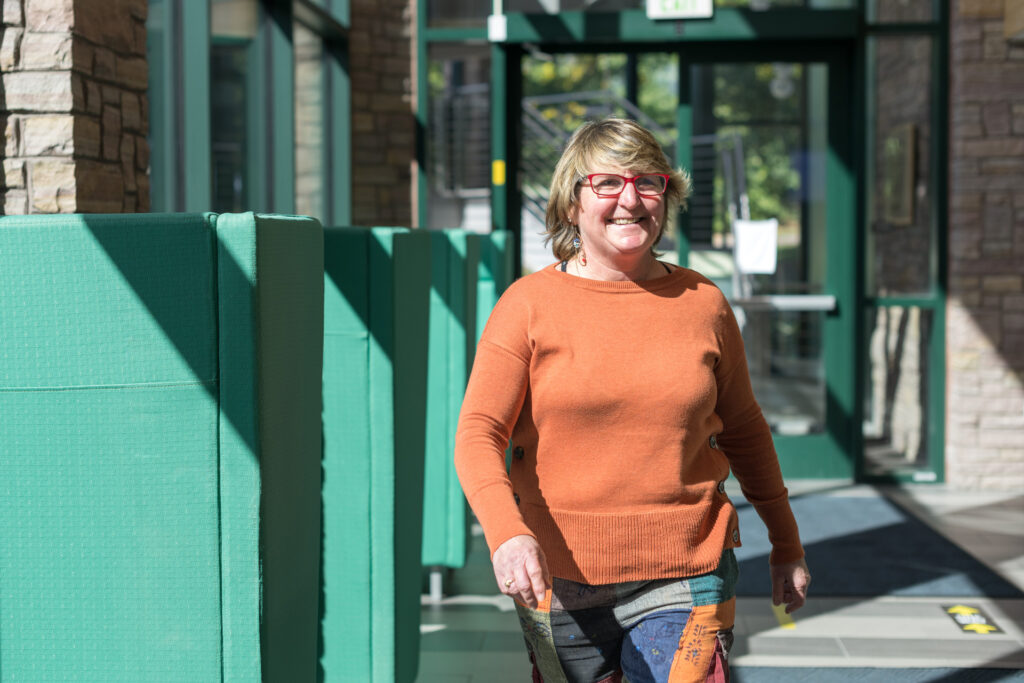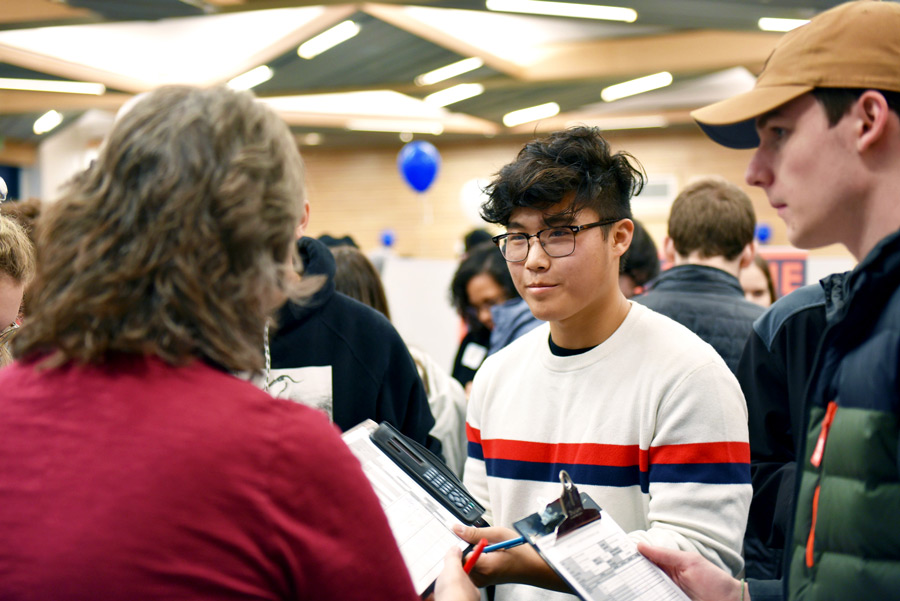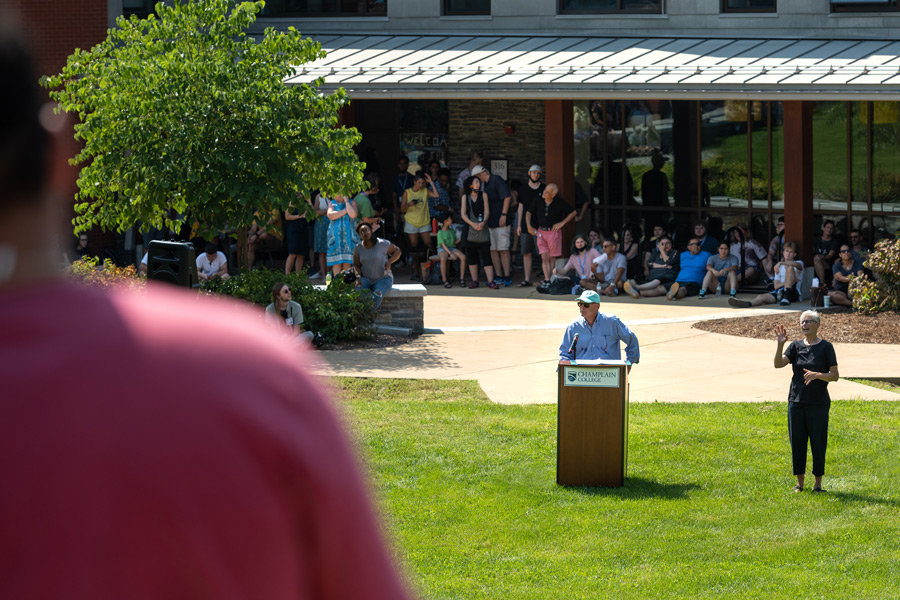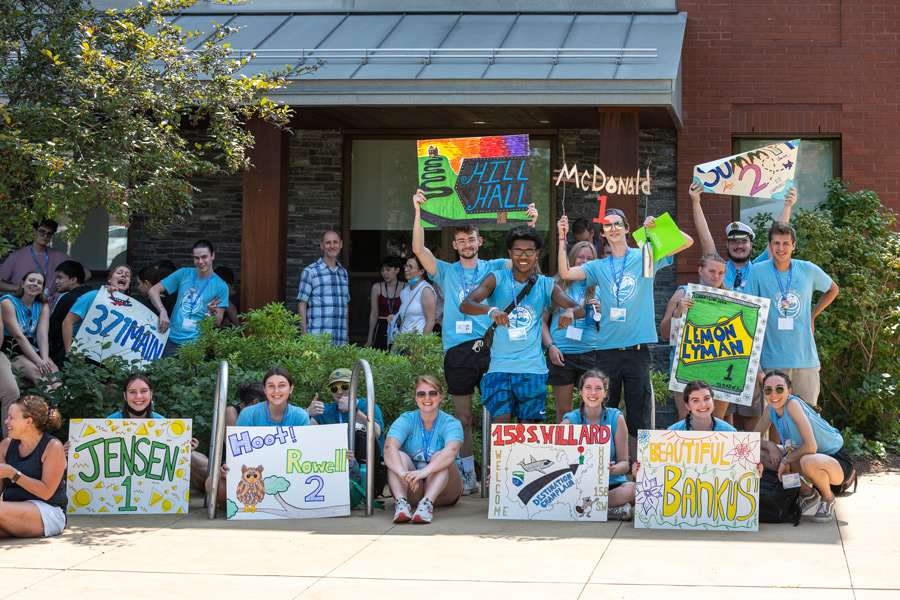No matter their major, every student at Champlain College can become an expert in the same topic: well-being.
Courses, clubs, a podcast, a newsletter, a magazine and a YouTube channel all are devoted to helping students — faculty and staff, too — live balanced, healthy lives. And more initiatives are in the works. The idea, says Dr. Kimberly Quinn, who teaches in Champlain’s Psychology program, is to embed well-being into the curriculum and campus lifestyle. “We want it to flow through the community like water through a faucet.”
Call it Life 101, the Champlain College universal prerequisite. “Because without well-being,” says Dr. Quinn, “there is nothing else.”
Think about learning from a cognitive perspective, she says. When people are anxious, their minds aren’t in the classroom; they’re leaping from topic to topic in what she calls monkey-mind thoughts. “Very little new information is going to get in because when the survival brain is up front trying to manage the … racing monkey-mind thoughts, new information is going to take a backseat to that.” Dr. Quinn says. Society, especially in the United States, has it backwards, she says. It says, once I become successful, I will be happy. “And it’s the exact opposite.”


Dr. Quinn teaches Mindcraft: The Scientific Study of Optimal Well-Being and Life Satisfaction. Required for Psychology majors, it’s a popular elective for other students. Like other instructors, Dr. Quinn starts each class with a mindfulness exercise. She might play music, guide her students through a few minutes of intentional breathing or a visualization. Students may imagine leaves floating down a river; they mentally lay their worries on the leaves and watch them float away.
Students may have shown up for class focused on an upcoming test or a mounting conflict with their roommate. “The body is in the chair, and the brain is in next Tuesday,” Quinn says. Intentional breathing resets the mind and brings it back into the body.
She brings students out of the exercise, then asks them to say, out loud, three things they are grateful for. And it’s mandatory to start the list with the words, I am grateful for. The brain loves patterns, Dr. Quinn explains. If you’re a negative thinker, your brain automatically routes you to negativity. Practicing gratitude sends it on a different track. “Students will automatically start to see the positive in their day without any extra effort,” Dr. Quinn says.
If you’re a negative thinker, your brain automatically routes you to negativity. Practicing gratitude sends it on a different track. Students will automatically start to see the positive in their day without any extra effort.
Dr. Kimberly Quinn, Well-Being & Success Coach at Champlain College
Mastering such skills is crucial — now more than ever. Anxiety and depression among children has increased over time, the Centers for Disease Control reports. “Ever having been diagnosed with either anxiety or depression” among children aged 6–17 years increased from 5.4% in 2003 to 8% in 2007 and to 8.4% in 2011–2012.
Current college students are the most traumatized generation yet, Dr. Quinn believes. Research, including her own, lays much of the blame on social media. As social media use goes up, life satisfaction goes down, Dr. Quinn says. In her study on Facebook, two students wrote in the margins, “Am I the only one who has the highest score you can get on depression?”
Lay over all of this a global pandemic. “Typically, people go through short-term traumas,” says Dr. Laurel Bongiorno, former Dean of Champlain’s Division of Education & Human Studies. “And everyone now has been through a long-term trauma.”
The school is doubling down now, but care for the whole person is not a new concept here. Champlain is a small school where faculty have always been engaged with students. It requires traditional undergraduates to participate in InSight, a program that teaches career positioning, personal finance, and most recently well-being. Genuine support for students helped draw Dr. Barbara Colombo from a research university in her native Italy to teach at Champlain. “One of the reasons that students drop out from college is emotion dysregulation and lack of social support,” she says. The Champlain Neuroscience Lab she directs is producing a paper on the topic. “Champlain addresses this before it becomes an issue,” she says.


Faculty and staff well-being is a priority, too. “I’ll just tell a personal story,” Dr. Bongiorno says. “I used to quietly go to a yoga class on Tuesdays at lunch.” As a dean, she wasn’t sure she should be taking a whole hour off for yoga. Then she thought, I should be modeling this behavior. “… I started saying, ‘I’m going to yoga today at lunch. Does anyone want to join me?’”
During his first term as president, David Finney closed campus for the last week of the calendar year, and he asked faculty and staff to pledge not to use their work email. The rule still exists today. “He understood how important it is to take a break,” Dr. Bongiorno says.


In the meantime, Champlain:
- has become a JED Campus, a signature program of The Jed Foundation designed to help schools develop and build upon systems, programs, and policies regarding student mental health, substance use, and suicide prevention.
- maintained its educational approach steeped in positive psychology. For example, students don’t go on academic or conditional probation anymore. It’s “academic recovery,” says Dr. Bongiorno. “The deans decided that we should really call things what we meant them to be and, really, academic probation and conditional probation sound like we’re questioning their ability to succeed. Academic recovery sounds like we want you to succeed.”
- hosted the Champlain Resilience Conference, open to all faculty, staff, and students. The conference met on four afternoons in September to cover topics such as self-care, understanding trauma, and teaching strategies that support student resilience.
- supports Dr. Quinn’s weekly newsletter called “The Mindful Times: a Mini Mag for Living Your Best Life.” Her Mindcraft YouTube channel is a podcast and video series designed to help viewers become the boss of their brains and achieve optimal human function and life satisfaction. Dr. Quinn’s Mindcraft podcast, available on Spotify, has listeners in 54 countries, and her ideas about overcoming shame and recapturing a sense of original worthiness have been shared from the TEDx stage.


Ultimately, says Dr. Leslie Averill, Champlain’s Executive Vice President and Chief Operating Officer, we aim to create a community where young minds develop into healthy, successful graduates who can thrive in a dynamic world. “Ensuring the well-being of our students, staff and faculty is a cornerstone of our strategy to create a flourishing community and deliver on an outstanding educational experience for our students.”